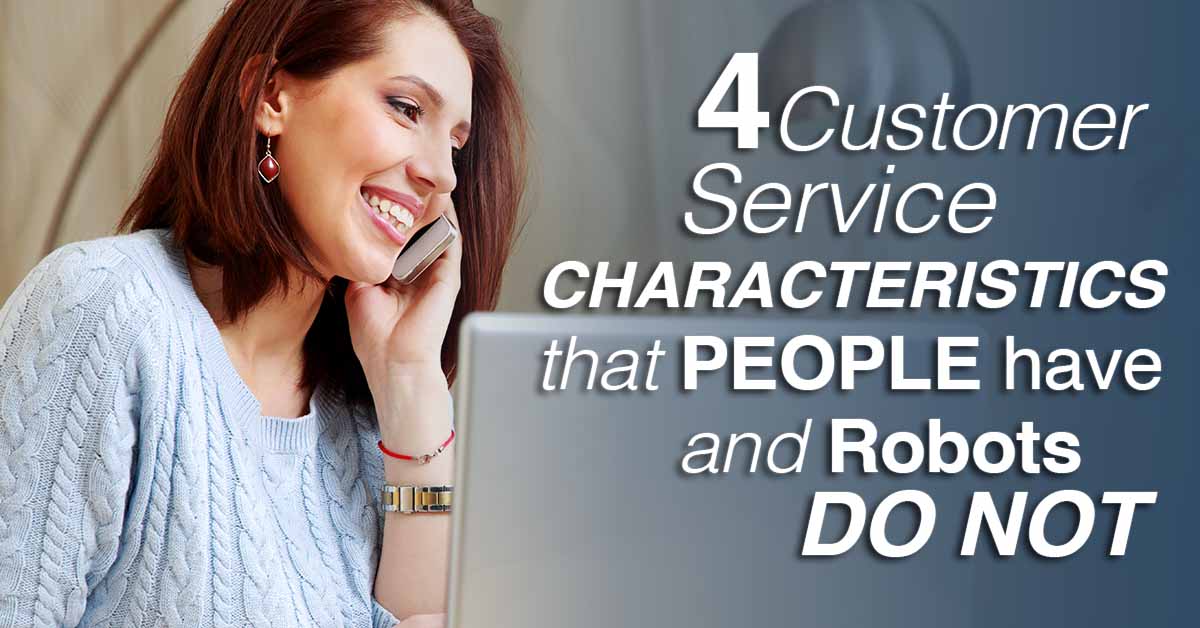
4 Customer Service Characteristics That People Have and Robots Do Not
Let’s get real for a moment. The robots are worthy adversaries.
Robots don’t show up late to work, robots don’t complain, and robots can be very efficient. The reality is that if we try to beat the robots in the areas that they are strongest we are doomed to lose.
But there is good news! In the same way that robots have characters that make them far superior people, people have a lot of characteristics that give us an advantage over the robots.
By emphasizing the things that make humans awesome at customer service we will be able to push back against the robot invasion and hold our ground in customer service. So in this article, we will go over what these differences are and how you can maximize your potential to resist the robots!
1: Humans can Smile
A smile is perhaps one of the most important and powerful non-verbal expressions that a person can make. It is so powerful in fact that at Resist the Robots we have made a smile the official salute of the resistance.
The power and importance of smiling have been known for a very long time. In his book How to Win Friends and Influence People Dale Carnegie listed smiling as one of the most important actions to winning over people.
“Happiness does not depend on outside circumstances, but rather on inward attitudes. Smiles are free to give and have an amazing ability to make others feel wonderful. Smile in everything that you do.” - Dale Caregie
One of the most important roles of customer service in an organization is to build trust. The faster and more effectively you can build trust with customers the more effective your customer service is. Giving a genuine smile is one of the simplest things that a person can do to connect with another person to establish trust.
This also doesn’t just apply to face-to-face interactions. Even when speaking on the phone, a smile can be heard and felt subconscious. Research has shown that there are roughly 50 different kinds of smiles and that these different smiles can be understood by audio alone without even seeing a face.
This is why having a genuine smile in every interaction is so important. When I was working front line retail one of the things I would frequently do is find really funny video clips online. These had to be things that didn’t just make me smile but had a strong emotional reaction that caused me to laugh out loud.
When I wasn’t feeling particularly smiley I would watch one (or more) of these videos or if I couldn’t watch the video I would think back to the video and often that was enough to put a genuine smile on my face.
2: Humans can Empathize
This is one of the most important characteristics of being human. Without the ability to empathize with other people entire industries such as the film industry and advertising would not exist.
When we watch our favorite movie and see people struggle against insurmountable challenges it is our empathy that makes us care about the fictional character. And when we see the hero triumph it is our empathy that fills us with the hope that we may also be able to triumph.
The same thing happens with marketing. When we see an ad of someone taking a big bite of a Big Kahuna Burger it makes us want to drive down that Hiwian burger joint and grab a tasty burger for breakfast. But it is only because of our empathy that we can look at the image or video of someone else eating something and understand that they are enjoying the food and we can too.
Robots can’t do this. Robots don’t feel hunger or pain or struggle. So when a customer comes into our place of business with a problem they want us to solve, as humans, we can use our empathy to connect with the customer and help them find a solution to their problem.
Showing empathy is also one of the most effective ways of connecting with an individual on a human level. In one of my previous jobs, I analyzed the google and Facebook we were receiving and there was a very interesting observation. The negative reviews were attacking a company and the positive reviews were praising a person.
Customers become fanatics of a brand not because of objectively superior products but because of the people who represent the brand. This is the effect of empathy in customer service.
3: Humans can Listen
Microphones indeed exist. You can say “Hey, Siri” or “Okay, Google” and your device will respond. We call this listening but this is a bit of a misnomer.
It’s almost a cliche where a couple is talking to each other and the woman says one thing and the man responds to it and then the woman says “you’re not listening to me.” Listening is more than just hearing, it is being attentive to not only what a person is saying but how they say it and even what they don’t say.
Robots can only detect the vocal patterns that match pre-defined vocal patterns and interpret the information in the most literal way. Yes, sometimes jokes can be coded in and AI is becoming better at “reading between the lines”, particularly with GPT-3. However, even these systems are not able to detect and interpret the subtleties of vocal inflection and the significance of what is not said.
The challenge here is that most people do a poor job at listening. I will often observe a customer service worker talking with a customer and both people are talking about different things. They aren’t listening to what is actually being said but instead, they make assumptions about what the person is saying.
The reason this happens is that we often fall into patterns. Customers will ask about the same thing again and again until we just assume that this is what customers are going to be asking or saying. You may be in your 1000 interactions with a customer but this is likely the first time the customer is interacting with your company’s customer service. This is why it is so important to treat every situation as an individual interaction.
4: Humans can Adapt Quickly
Being able to adapt quickly is one of the most important survival traits that has allowed humans to flourish. Our ability to adapt has allowed humans to live in nearly every climate on earth from deserts to arctic claimants to swamps and rainforests.
But we are not only able to adapt on a macro level but on a micro level as a situation changes. With machine learning, computers can adapt but the adaptation is a slow process and only in a very narrow area.
If a customer comes into a retail store unable to speak English (or whatever language is spoken) a person can adapt to the situation and come up with a way to work around the language barrier. A robot, on the other hand, can only do exactly what it is told to do and if it isn’t told to speak Chinese it won’t figure out a way to communicate with someone who only speaks Chinese
Our ability to adapt and problem solve is a very important part of customer service. Each customer has a slightly different situation and our ability to adapt quickly to these differences provides the customer with the feeling that they are receiving a unique experience that will get them coming back again and again.
Conclusion
Einstein once said, “...if you judge a fish by its ability to climb a tree, it will live its whole life believing that it is stupid.” A lot of people talk about how robots are better at doing things than humans but this is exactly what Einstein warned against. Research has shown that our decisions are made by emotions and not logic so embracing the emotional perspectives of our customers will allow us to be no match for the robots.
Let’s stop comparing how humans are not able to do the things that robots can do better but rather focus on all of the things that make humans amazing.

